

Sri Sathya Sai Baba Jnana Vahini. If fire can give the splendour, then, why does not a stick or blade or pebble placed in the fire become as shining as gold?
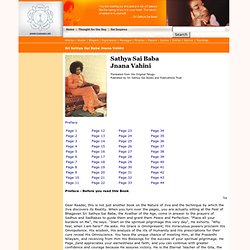
So one has to conclude that the splendour came not through fire but out of its own inner nature. The Prathyagatma, or the Inner presiding Atma, is separate from the Five Sheaths of the Individual, the Panchakosas; it shines with its own splendour; it is the witness of the activities and consequences of the three Gunas; it is immovable; it is holy and pure; it is eternal; it is indivisible; it is self-manifested; it is Peace; it has no end; it is wisdom itself. Such an Atma has got to be cognised as Oneself! To realise this Atma, this Jnanaswarupa, there are four obstacles to be overcome: Laya, Vikshepa, Kshaya and Rasa-aaswaadanam. Sathya Sai Baba - Dhyana Vahini - Index. Sathya Sai Baba Jyoti Meditation. Jyoti Meditation See also: Sai Baba's Views on Meditation Meditation - Compiled from the discourses of Bhagavan Sri Sathya Sai Baba Download .pdf file: Jyoti Meditation "As regards the technique of meditation, different teachers and trainers give different forms of advice.
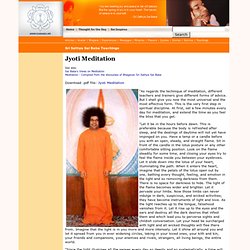
Ways of existing? @kennethamy, kennethamy;140746 wrote: Many posters tell us that this or that exists in a different way from something else.
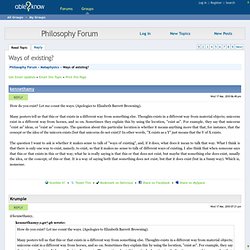
So I propose that corporeal objects exist in a different way to abstract things such as theories or ideas. Why is it not self-evident that different types of things exist in different ways? Even Aristotle recognised that. ---------- Post added 03-18-2010 at 07:58 PM ---------- Humanity;140819 wrote: 'Exist' is just the verb "is". I don't know about that. That which is, by way of distinction, is a different level of meaning in philosophy. So in fact the most basic question in philosophy used to be 'what truly is' as distinct from 'what simply exists'.
One can differentiate being from existence. Now this is generally not accepted by analytical or modern philosophy for reasons which we all know. There's some food for thought, anyway. Naïve realism. Naïve realism argues we perceive the world directly.
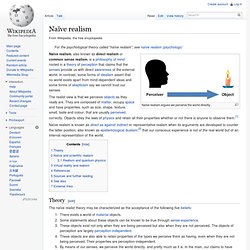
Naïve realism (psychology) The three "tenets" of naive realism are: Biases including the following have been argued to be caused at least partially by naive realism:
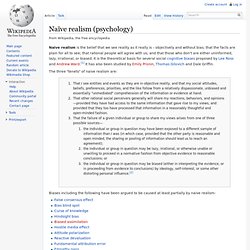
Richard Rorty. Richard McKay Rorty (October 4, 1931 – June 8, 2007) was an American philosopher.

Educated at the University of Chicago and Yale University, he had strong interests and training in both the history of philosophy and contemporary analytic philosophy, the latter of which came to comprise the main focus of his work at Princeton University in the 1960s. He subsequently came to reject the tradition of philosophy according to which knowledge concerns correctly representing a world whose existence remains wholly independent of those representations. Rorty had a long and diverse academic career, including positions as Stuart Professor of Philosophy at Princeton University, Kenan Professor of Humanities at the University of Virginia, and Professor of Comparative Literature at Stanford University.
His best known books[1] are Philosophy and the Mirror of Nature (1979) and Contingency, Irony, and Solidarity (1989). Biography[edit] Parmenides. Parmenides of Elea (/pɑrˈmɛnɨdiːz əv ˈɛliə/; Ancient Greek: Παρμενίδης ὁ Ἐλεάτης; fl. 5th century BCE) was an ancient Greek philosopher born in Elea, a Greek city on the southern coast of Magna Graecia.

He was the founder of the Eleatic school of philosophy. The single known work of Parmenides is a poem, On Nature, which has survived only in fragmentary form. In this poem, Parmenides describes two views of reality. The Varieties of Expression. The Secret, by Dr. Greg Goode. The Enlightenment Secret You are not a separate being.

You are Being, and never separate. This is the Enlightenment, the happiness, in which all apparent things consist. It is the very Being of you. Did Samuel Johnson misunderstand George Berkeley? @kennethamy, kennethamy;131452 wrote: But don't you think that even Berkeley would distinguish between the sensation of kicking a rock, and kicking a rock?
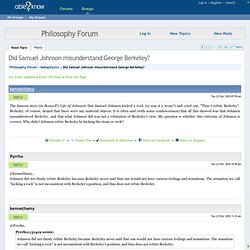
George Edward Moore. First published Fri Mar 26, 2004 G.E.
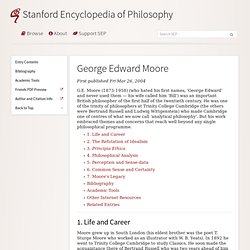
Moore (1873-1958) (who hated his first names, ‘George Edward’ and never used them — his wife called him ‘Bill’) was an important British philosopher of the first half of the twentieth century. He was one of the trinity of philosophers at Trinity College Cambridge (the others were Bertrand Russell and Ludwig Wittgenstein) who made Cambridge one of centres of what we now call ‘analytical philosophy’. On Berkeley and Advaita. Writing about Berkeley in 'The Story of Philosophy', Will Durant says: "It was a brilliant idea – to refute materialism by the simple expedient of showing that we know of no such thing as matter.
In all Europe, only a Gaelic imagination could have conceived this metaphysical magic. " But this magic had already been conceived elsewhere in the world over two thousand years ago. It was a passing show that came to India with the Buddhists and went along with them. Readings and Links. Standing as Awareness: The Direct Path New, Expanded Edition, Foreword by Jerry Katz. Non-Duality Press, October 2009. When you take a stand as awareness, you don't take yourself as an object such as the body or a personalized mind state, but as awareness itself. You come to experience awareness confirming your stand. Another Kind of Self-Inquiry, by Greg Goode. A chariot is not asserted to be other than its parts, Nor non-other. It also does not possess them. It is not in the parts, nor are the parts in it. It is not the mere collection [of its parts], nor is it their shape. [The self and the aggregates are] similar. – Chandrakirti, Supplement to (Nagarjuna’s) “Treatise on the Middle Way” Introduction When I was about ten years old, my friends and I would throw rocks at each other.
The Sevenfold Reasoning is a Buddhist meditation on the ultimate nature of things – persons (the “I”) and phenomena. The Sevenfold Reasoning is a set of inferences that one contemplates deeply. (Back to top) Mistaken Conception. Nondual Emptiness Teachings. Why Emptiness? Emptiness is another kind of nondual teaching. Emptiness teachings demonstrate that the "I," as well as everthing else, lacks inherent existence. The notion of lacking inherent existence has several senses. In one sense, empty things lack essence, which means that there is no intrinsic quality that makes a thing what it is. In another sense, empty things lack independence, which means that a thing does not exist on its own, apart from conditions, relations or cognition. Luthar.Com: HarshaSatsangh.